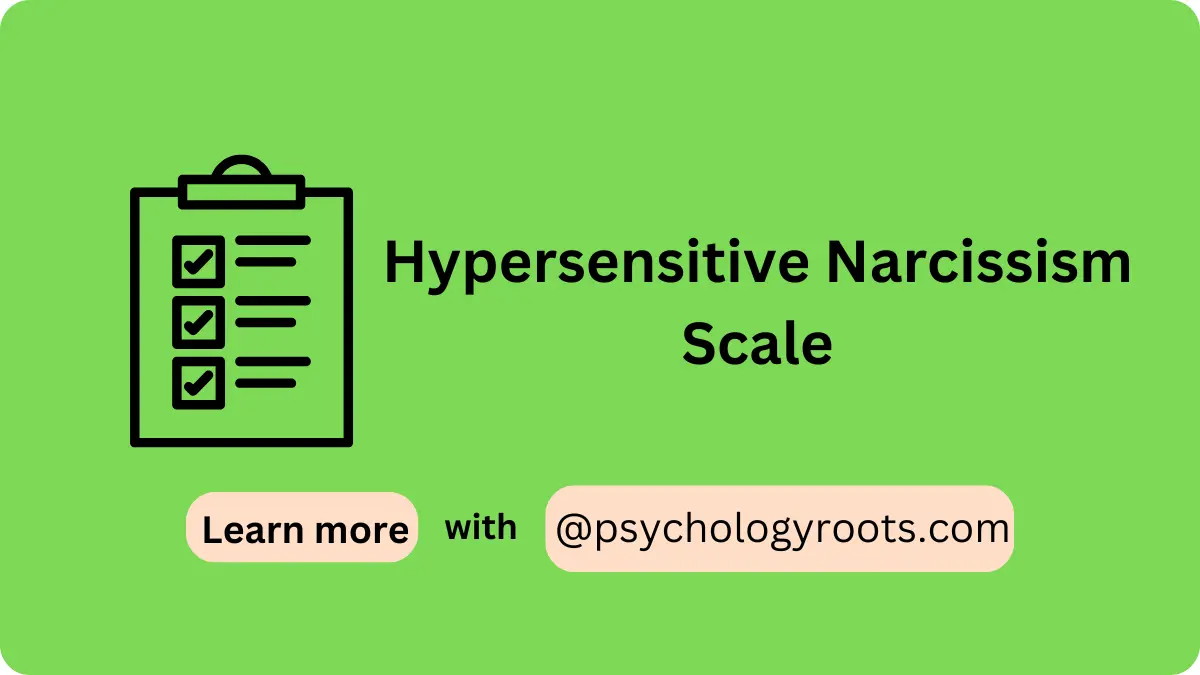Table of Contents
Hypersensitive Narcissism Scale
Here in this post, we are sharing the “Hypersensitive Narcissism Scale”. You can read psychometric and Author information. We have thousands of Scales and questionnaires in our collection (See Scales and Questionnaires). You can demand us any scale and questionnaires related to psychology through our community, and we will provide you with a short time. Keep visiting Psychology Roots.
About Hypersensitive Narcissism Scale
Scale Name
Hypersensitive Narcissism Scale
Author Details
Hendin, H. M., and Cheek, J. M.
Translation Availability
English

Background/Description
The Hypersensitive Narcissism Scale (HSNS), developed by Hendin and Cheek in 1997, is a psychological tool designed to measure traits associated with hypersensitive, vulnerable forms of narcissism. Distinct from overt narcissism, hypersensitive narcissism encompasses characteristics like sensitivity to criticism, insecurity, and a deep-seated need for validation that may not be openly displayed. Individuals scoring high on the HSNS tend to be introspective, self-critical, and highly aware of perceived slights or judgments from others. This form of narcissism often manifests in subtle ways and is linked to emotional instability and a predisposition toward social anxiety and depression. The HSNS is useful in both clinical and research settings, as it helps professionals identify narcissistic traits that may contribute to personal and interpersonal challenges, and it provides valuable insights into the internal struggles that accompany hypersensitivity in narcissism.
Administration, Scoring and Interpretation
- Obtain the Copy: The HSNS can be obtained through academic journals or psychological assessment resources.
- Purpose: To assess hypersensitive narcissistic traits, focusing on self-consciousness, emotional reactivity, and vulnerability.
- Instructions: Participants respond to statements on a Likert-type scale that assesses the degree of agreement with statements related to hypersensitivity, criticism, and self-perception.
- Time: Approximately 5-10 minutes to complete.
- Administer the Scale: This scale can be self-administered or conducted in a clinical setting, with responses recorded either on paper or digitally.
Reliability and Validity
The HSNS demonstrates good internal consistency, with a Cronbach’s alpha typically ranging between 0.70 and 0.80, which supports its reliability. Validity is confirmed through correlations with other measures of self-consciousness, neuroticism, and introversion, making it a credible tool for assessing hypersensitive narcissistic traits. The HSNS has been shown to be stable across different populations, contributing to its usefulness in diverse settings.
Available Versions
10-Items
Reference
Hendin, H. M., & Cheek, J. M. (1997). Assessing hypersensitive narcissism: A reexamination of Murray’s Narcism Scale. Journal of research in personality, 31(4), 588-599.
Important Link
Scale File:
Frequently Asked Questions
What is hypersensitive narcissism?
Hypersensitive narcissism is a subtype of narcissism marked by insecurity, emotional sensitivity, and heightened awareness of criticism.
How does the HSNS differ from other narcissism scales?
The HSNS specifically targets the vulnerable, hypersensitive aspects of narcissism, unlike scales that measure overt or grandiose narcissism.
Is the HSNS reliable?
Yes, the scale has demonstrated good reliability and validity, with consistent results across various studies.
Who should take the HSNS?
The scale is valuable for individuals in clinical or research settings who may exhibit traits of vulnerable narcissism or struggle with self-criticism and sensitivity.
Disclaimer
Please note that Psychology Roots does not have the right to grant permission for the use of any psychological scales or assessments listed on its website. To use any scale or assessment, you must obtain permission directly from the author or translator of the tool. Psychology Roots provides information about various tools and their administration procedures, but it is your responsibility to obtain proper permissions before using any scale or assessment. If you need further information about an author’s contact details, please submit a query to the Psychology Roots team.
Help Us Improve This Article
Have you discovered an inaccuracy? We put out great effort to give accurate and scientifically trustworthy information to our readers. Please notify us if you discover any typographical or grammatical errors.
Make a comment. We acknowledge and appreciate your efforts.
Share With Us
If you have any scale or any material related to psychology kindly share it with us at psychologyroots@gmail.com. We help others on behalf of you.